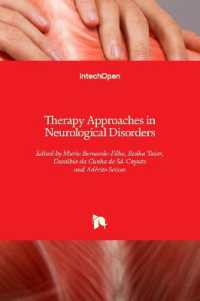- ホーム
- > 洋書
- > 英文書
- > Psychology
基本説明
Offers a fascinating insight into the psychological development of infants. Topics: Perception; Memory Development; Intervention Research; Culture and Infancy; and more.
Full Description
Infants may seem to do little more than eat, sleep, and play. Yet behind this misleadingly simplistic façade occurs an awe-inspiring process of development through which infants make sense of, and learn how to interact with, the world around them.
Introduction to Infant Development 2/e offers a fascinating insight into the psychological development of infants, presented by some of the world's leading authorities on the subject. This new edition captures the latest developments in the field, with new chapters on perceptual and cognitive development, memory development, and gender, culture, and social class. It also offers completely revised treatments of language development, and motor development, making these topics more relevant and more engaging to the student audience.
With new learning features throughout, and a new Online Resource Centre, Introduction to Infant Development is the ideal teaching and learning tool for studying this intriguing field.
Online Resource Centre:
The Online Resource Centre features the following materials:
For registered adopters of the book:
- Figures from the book available to download, to facilitate lecture preparation
For students: - Multiple-choice question to check understanding, and support revision
Contents
1. A brief history of infancy research ; 2. Basic methods in infant research ; 3. Prenatal development ; 4. Motor development: How infants get into the act ; 5. The development of the senses ; 6. The development of intelligence in infancy ; 7. Categorization ; 8. Perception and knowledge of the world ; 9. Memory development ; 10. Language development: From speech perception to first words ; 11. How infants perceive and process faces ; 12. Early emotional development ; 13. Social development ; 14. Infants at play: development, functions, and partners ; 15. Learning to communicate ; 16. Early intervention research, services and policies ; 17. Culture and infancy ; 18. Health, nutrition and atypical development








